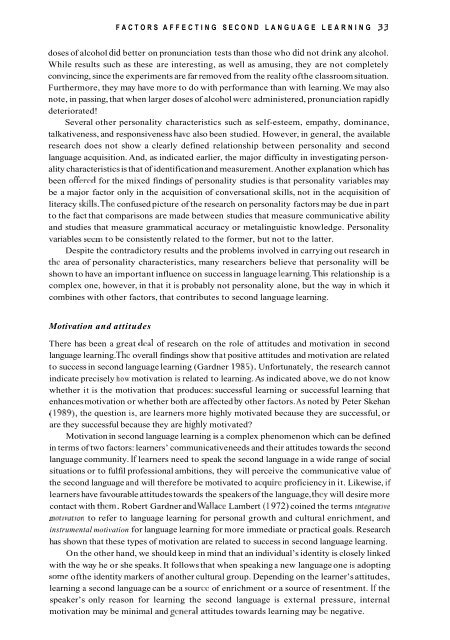English Language Teaching in its Social Context
English Language Teaching in its Social Context
English Language Teaching in its Social Context
Create successful ePaper yourself
Turn your PDF publications into a flip-book with our unique Google optimized e-Paper software.
FACTORS AFFECTING SECOND LANGUAGE LEARNING 33doses of alcohol did better on pronunciation tests than those who did not dr<strong>in</strong>k any alcohol.While results such as these are <strong>in</strong>terest<strong>in</strong>g, as well as amus<strong>in</strong>g, they are not completelyconv<strong>in</strong>c<strong>in</strong>g, s<strong>in</strong>ce the experiments are far removed from the reality ofthe classroom situation.Furthermore, they may have more to do with performance than with learn<strong>in</strong>g. We may alsonote, <strong>in</strong> pass<strong>in</strong>g, that when larger doses of alcohol werc adm<strong>in</strong>istered, pronunciation rapidlydeteriorated!Several other personality characteristics such as self-esteem, empathy, dom<strong>in</strong>ance,talkativeness, and responsiveness have also been studied. However, <strong>in</strong> general, the availableresearch does not show a clearly def<strong>in</strong>ed relationship between personality and secondlanguage acquisition. And, as <strong>in</strong>dicated earlier, the major difficulty <strong>in</strong> <strong>in</strong>vestigat<strong>in</strong>g personalitycharacteristics is that of identification and measurement. Another explanation which hasbeen offered for the mixed f<strong>in</strong>d<strong>in</strong>gs of personality studies is that personality variables maybe a major factor only <strong>in</strong> the acquisition of conversational skills, not <strong>in</strong> the acquisition ofliteracy skills.The confused picture of the research on personality factors may be due <strong>in</strong> partto the fact that comparisons are made between studies that measure communicative abilityand studies that measure grammatical accuracy or metal<strong>in</strong>guistic knowledge. Personalityvariables seem to be consistently related to the former, but not to the latter.Despite the contradictory results and the problems <strong>in</strong>volved <strong>in</strong> carry<strong>in</strong>g out research <strong>in</strong>the area of personality characteristics, many researchers believe that personality will beshown to have an important <strong>in</strong>fluence on success <strong>in</strong> language 1earn<strong>in</strong>g.This relationship is acomplex one, however, <strong>in</strong> that it is probably not personality alone, but the way <strong>in</strong> which itcomb<strong>in</strong>es with other factors, that contributes to second language learn<strong>in</strong>g.Motivation and attitudesThere has been a great deal of research on the role of attitudes and motivation <strong>in</strong> secondlanguage learn<strong>in</strong>g. The overall f<strong>in</strong>d<strong>in</strong>gs show that positive attitudes and motivation are relatedto success <strong>in</strong> second language learn<strong>in</strong>g (Gardner 1985). Unfortunately, the research cannot<strong>in</strong>dicate precisely how motivation is related to learn<strong>in</strong>g. As <strong>in</strong>dicated above, we do not knowwhether it is the motivation that produces: successful learn<strong>in</strong>g or successful learn<strong>in</strong>g thatenhances motivation or whether both are affected by other factors. As noted by Peter Skehan(1989), the question is, are learners more highly motivated because they are successful, orare they successful because they are highly motivated?Motivation <strong>in</strong> second language learn<strong>in</strong>g is a complex phenomenon which can be def<strong>in</strong>ed<strong>in</strong> terms of two factors: learners’ communicative needs and their attitudes towards the secondlanguage community. If learners need to speak the second language <strong>in</strong> a wide range of socialsituations or to fulfil professional ambitions, they will perceive the communicative value ofthe second language and will therefore be motivated to acquirc proficiency <strong>in</strong> it. Likewise, iflearners have favourable attitudes towards the speakers of the language, they will desire morecontact with thcm. Robert Gardner andwallace Lambert (1 972) co<strong>in</strong>ed the terms <strong>in</strong>tep~tivemotivat7on to refer to language learn<strong>in</strong>g for personal growth and cultural enrichment, and<strong>in</strong>strumental motivation for language learn<strong>in</strong>g for more immediate or practical goals. Researchhas shown that these types of motivation are related to success <strong>in</strong> second language learn<strong>in</strong>g.On the other hand, we should keep <strong>in</strong> m<strong>in</strong>d that an <strong>in</strong>dividual’s identity is closely l<strong>in</strong>kedwith the way he or she speaks. It follows that when speak<strong>in</strong>g a new language one is adopt<strong>in</strong>gSome ofthe identity markers of another cultural group. Depend<strong>in</strong>g on the learner’s attitudes,learn<strong>in</strong>g a second language can be a source of enrichment or a source of resentment. If thespeaker’s only reason for learn<strong>in</strong>g the second language is external pressure, <strong>in</strong>ternalmotivation may be m<strong>in</strong>imal and general attitudes towards learn<strong>in</strong>g may be negative.












